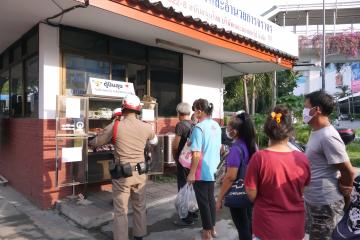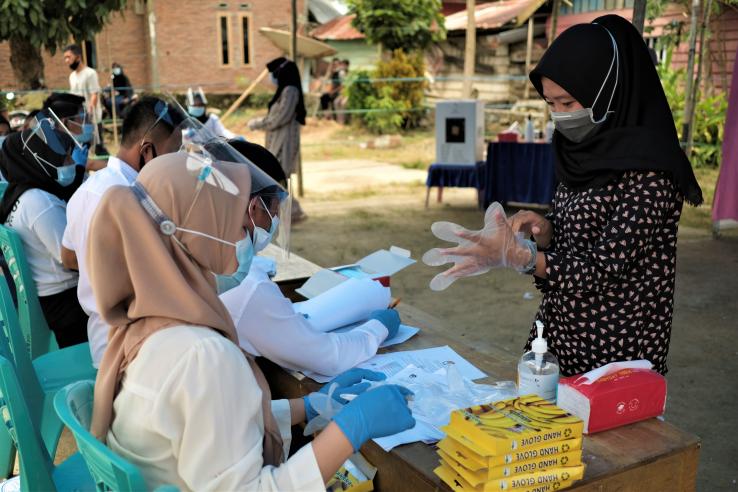
Generating evidence-based insights for good governance during and after Covid-19

The Covid-19 pandemic has emphasized the need for good governance: In response to the pandemic and its economic impacts, governments around the world were forced to act quickly to mobilize resources to protect their citizens. As of December 2020, a total of 215 countries or territories had planned or implemented a total of 1,414 social protection measures, ranging from cash transfers (166 countries) to unemployment benefits (73 countries) and labor market regulations (28 countries).
Whether governments are able to collect and spend the revenues needed for such a response in an efficient and accountable way, keeping the needs of the most vulnerable at the forefront, is therefore a paramount concern. At the same time, overburdened health systems have underlined the need for a robust and efficient public health infrastructure—and the importance of strong public service delivery more broadly.
How to achieve good governance—as measured by accountability, government effectiveness, and control of corruption—is a question that has been at the heart of J-PAL’s Governance Initiative (GI) since its inception in 2011. In response, GI funds rigorous experimental research projects tackling a research agenda of open questions about how to effectively improve governance outcomes in low- and middle-income countries.
Funding rigorous research to improve the quality of governance
To date, GI has funded more than 110 randomized evaluations across 44 countries through a semi-annual review process that issues requests for proposals (RFPs) to a pool of eligible researchers. These evaluations have produced crucial insights on what is most effective (and least effective) to improve governance, including through the generation of 52 academic publications and working papers.
GI awardees and staff work to ensure these insights have a real impact on policy through dissemination and engagement efforts with policymakers and key stakeholders, resulting in concrete cases of policy influence in diverse contexts ranging from Mexico City’s labor courts to Bangladesh’s apparel sector.
Generating insights in a Covid-19 context
In early February 2021, almost ten years after GI’s inaugural RFP, the initiative concluded its eighteenth round of funding, supporting five new full-scale research projects in Indonesia, Kenya, and India. The projects address questions within GI’s three key themes: strengthening political participation, improving state capacity, and reducing corruption and leakages.
GI’s five new funded projects were selected for their innovative research designs and ability to answer immediate policy-relevant questions, including two that are specific to Covid-19 response.
Tax compliance in Kenya
In an ongoing study in Kenya previously funded by GI, researchers Dina Pomeranz and Lorenzo Casaburi are collaborating with the Kenya Revenue Authority to investigate whether relaxing the timing of tax obligations for firms can increase their tax compliance. Researchers received new funding to study how payment plans can affect repayment of debt that firms accumulated during the economic closures due to Covid-19. In addition to responding to the policy priorities of the government, this evaluation has the potential to inform tax collection strategies after periods of crises by tax agencies in low and middle-income contexts.
Corruption on the Kenya-Uganda border
In a second ongoing study, also previously funded by GI, researchers Elisabeth Sadoulet and Eleanor Wiseman are studying corruption in trade across the Kenya and Uganda border through a randomized evaluation that provides information to traders about accurate tariff rates. In this GI funding round, they received additional funding that will allow them to expand their data collection activities to closely monitor how Covid-19 restrictions are impacting traders at the border. Findings from these surveys will be made publicly available to allow policymakers to adjust short-term Covid-19 response policies based on how the pandemic is impacting traders and their livelihoods.
Women’s political participation and village leadership training in Indonesia, community participation in infrastructure projects in India, and more
The three other funded studies evaluate the effects of gender inclusivity trainings on women’s political participation in Indonesia; the impact of a novel e-learning platform on the management and leadership practices of village government leaders, also in Indonesia; and the effectiveness of community involvement over planning and implementation of local irrigation infrastructure projects in India.
Overall, all five funded proposals consider a range of innovative interventions that could either be delivered safely in the context of Covid-19–including by utilizing virtual education platforms and phone-based survey methods–or implemented once in-person research is safe to conduct without significantly changing the scope of the proposed activities.
Next steps for addressing governance issues
Good governance will continue to be an issue central to poverty alleviation efforts well beyond Covid-19 and its aftermath. Billions of dollars will continue to be spent every year on programs designed to fight poverty and help those affected by the pandemic over the long term. These programs have incredible potential to improve lives—but impacts can still be limited by ineffective approaches and weak institutions.
We must continue to catalyze innovative research on what works—and what doesn’t—to strengthen governance, improve service delivery and accountability, and reduce poverty. GI’s research and policy change efforts will continue; the initiative will launch its nineteenth round of funding in the coming months. For any questions about GI’s work or the RFP process, please contact us.


